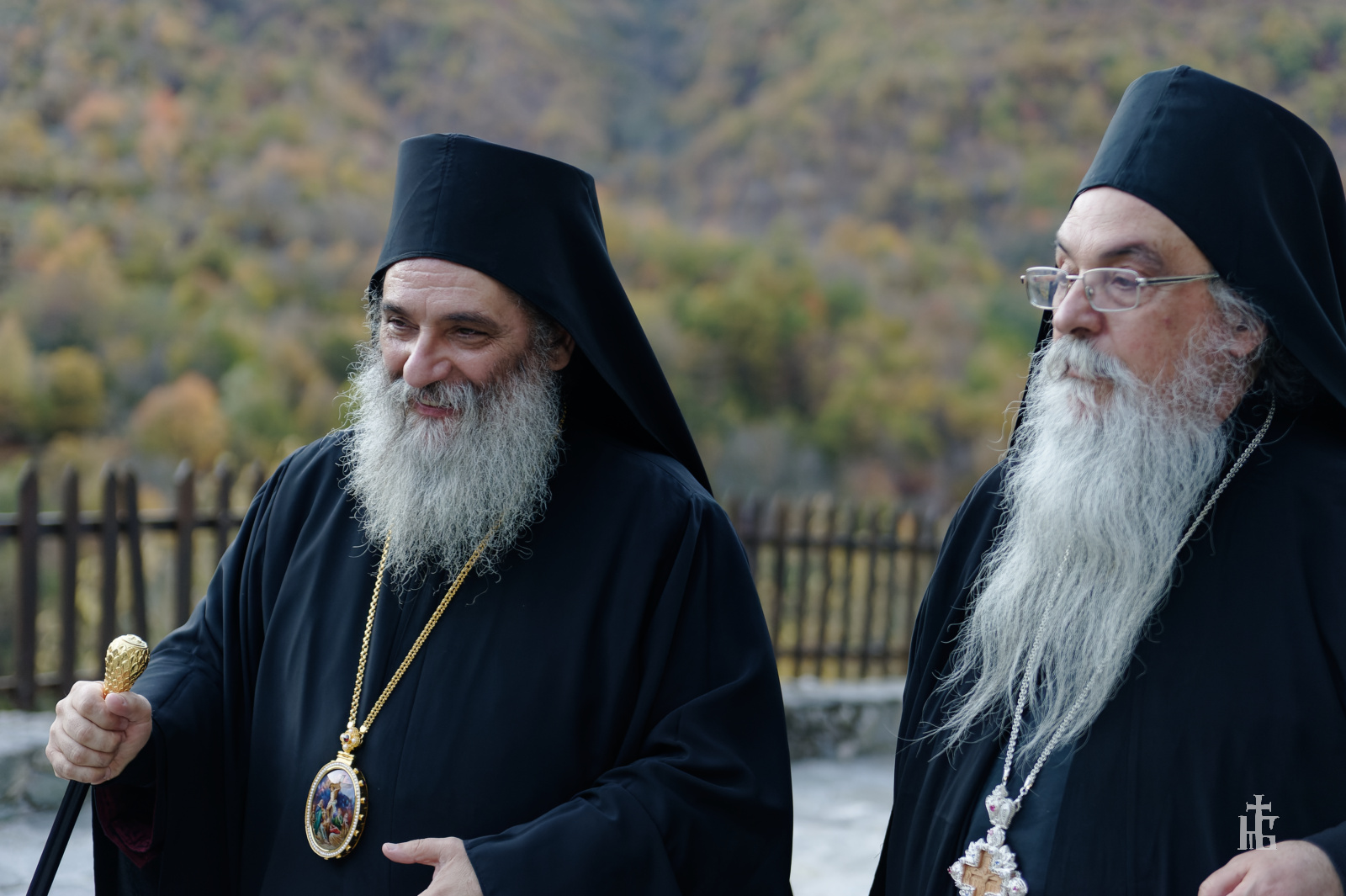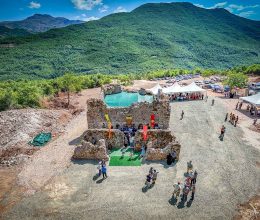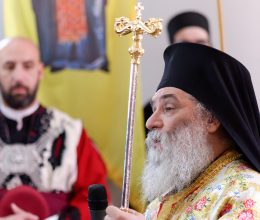The Holy Fathers of the Seventh Ecumenical Council, those wonderful God-loving and truth-loving pillars of the Church of Christ, shone like the many stars of the spiritual sky, because they gave themselves over to great dangers, tortures, and even death to defend the image of Christ, the icon of Christ, but also icons of the Saints, of those who had become filled with Christ. We feel their great blessing and support even today, when we venerate them with the greatest piety, offering them our honor and prayers.
The blessing of these Holy Fathers of the Seventh Ecumenical Council gave us great joy and their vigil and Divine Liturgy were a feast for the soul. In honor of their feast day, the Holy Fathers sent us the Most Reverend Archimandrite Chrysostom and the Most Venerable Hieromonk Eulogius, from the Monastery of the Holy Virgin Martyr Paraskevi in Mazi, Megara, Athens, Greece. To our great joy, about fifty Christ-loving souls, spiritual children, and pilgrims of their Monastery also came.

Archimandrite Chrysostom and his brethren were first welcomed with the formal rite of reception (ὑποδόχη), at which our Elder and that of Mazi exchanged greetings.
In his welcome address to our esteemed guests, our Abbot, Bp. Partenij of Antania expressed what honor and joy we felt at welcoming the fathers and brothers of the Monastery of St. Paraskevi in Mazi to our Monastery. Thus, we could repay them for the great hospitality with which they received us at their patronal feast day in July of this year. “Your monastery is a brother monastery for us, which is why today is a big holiday for us. Our first Liturgy near the capital of Greece, Athens, was right at your Monastery. When you invited us to your Monastery’s feast day and we came and served together with everyone else, we felt that it was a universal Monastery feast, an ecumenical feast.” Our Elder also pointed out Mazi Monastery’s role in the process of our church entering into canonical union with the rest of the Church. Our great friend and a fighter for Church unity, the Metropolitan of Adrianople, Bp. Amphilochios is a hierarch of the Ecumenical Patriarchate and with the support of the blessing and prayers of his Elder and brotherhood, he selflessly invested himself in solving our ecclesiastical issue. Finally, Bp. Partenij thanked Archimandrite Chrysostom for the good things he has done for us and wished the guests a warm welcome.
In response to our abbot’s words of welcome, Elder Chrysostom spoke these wonderful, inspired words:
“Most Reverend and Beloved Holy Abbot of this Sacred and Holy Monastery of the Venerable Forerunner and Baptist John, who honored us today by guiding our steps here, to the height of beauties, in the kingdom of beauty and the diadem of goodness created by the hand of God, during Creation and its development and course; honor us, therefore, to be here, in this most holy Temple of the Honorable Forerunner, and to see you again with great joy, together with all our fellow travelers, the people of Megara, friends of our Monastery…
God sets aside people for us, like our venerable Elder Damaskinos and Metropolitan Bartholomew of blessed memory, who really were people with the broadest minds, with hearts for the whole world, and they inspired us with that universality. That is why Metropolitan Amphilochios, our beloved brother and a pillar of our Monastery, when he discovered the situation found himself capable of setting it in order and helping to direct things towards the unity of the faith and communion of the Holy Spirit, Who establishes such a community so that we can experience the Church’s catholic, conciliar nature. Indeed, this year’s feast day was most dignified with your presence and with the presence of priests from Ukraine and Africa and other churches, together with the Holy Spirit that He may guide us in every truth, and the truth is that the Father and the Son and the Holy Spirit exist, the Trinity is one and inseparable and thus it follows that this is the unity of the Church…
So, we as Orthodox Christians must preserve the unity of the faith, and as monks, we try to serve this purpose. No disunity, no slander, no gossip, no exaggerations, and no extremes. Please pray for us and we are very grateful that you do. Together, let us all maintain this flame, Most Reverend Elder, the flame of unity in the Holy Spirit, to unite people with the Holy, the Thrice-Holy, and only God. We thank you for the reception, welcome, and hospitality, on behalf of all our pilgrims, and I ask the holy fathers and brothers of this Monastery to pray so that we always have this communion in the Holy Spirit. Pray for us.”

Elder Chrysostom took the opportunity of visiting our Monastery to give a word of instruction to our Monks:
“May you live, fathers, may you rejoice in your Elder, may you do what God wants, and do you know what God wants? (Will you let me say this to the fathers, Elder?) He wants that which is the essence of the monastic life: to rejoice in your Elder and support him by being obedient. Because you should know one thing. Just one thing and I’ll be done. And that is, to know that God is with the Elder… Nothing else, except to rejoice in the Elder and keep him.”
The guests from Greece, after their long journey to the Monastery, graced our Resurrectional vigil with their prayers and the Fathers’ prayerful monastic chanting. Today’s radiant Sunday was spent in joy, prayer, and thanksgiving, first of all with the Holy and Divine Hierarchal Liturgy, which was officiated by our Elder, Bp. Partenij. God’s abundant blessing poured out like heavenly wages through the Eucharistic concelebration with Archimandrite Chrysostom and Hieromonk Eulogius. The spirit of unity and the joy of it was felt by all those present, through the singing and prayers sung alternately in both languages.
This was the taste of heavenly food with which God feeds us, which our Elder Partenij put into words in his sermon following the Holy Gospel:
In the Name of the Father and of the Son and of the Holy Spirit
The Lord God created man so that he might be nourished and live forever. It is obvious that if we are not nourished with bodily food, we will undergo biological death. Exactly the same applies to eternal being: in order to exist with an eternal existence, we need to be nourished by the eternal God. When the beginningless Creator created man and placed him in the Garden of Eden, he also created food for him. In the first pages of the Book of Genesis, we read: “See, I have given you every herb that yields seed which is on the face of all the earth, and every tree whose fruit yields seed; to you, it shall be for food” (Genesis 1:29). There was only one tree, the tree of the knowledge of good and evil, from which man could not eat without God’s approval.

Furthermore, the man was nourished then by constant communion with God. The Creator of the universe came to Eden to speak with His creation face to face. However, as He knows, when Adam and Eve broke the only commandment, then the most horrible thing would happen— death. He was created to live and delight forever before the face of God, and then he died, both spiritually and biologically. What man needed was a life-giving medicine, a living food that would rejuvenate this dead man and restore his bodily and spiritual equilibrium, his original beauty. Such heavenly food came to us incarnate in the Person of the God-man Jesus Christ, as He Himself testifies in His Gospel: “I am the living bread which came down from heaven. If anyone eats of this bread, he will live forever; and the bread that I shall give is My flesh, which I shall give for the life of the world” (John 6:51).
In today’s Holy Gospel we heard the parable about the Word of God described as a fertile seed. Its simple beginning is very striking: “A sower went out to sow his seed” (Luke 8:5). He went out. From where did he go out? From where did that Divine Sower come into this world? “I came forth from the Father and have come into the world. Again, I leave the world and go to the Father” (John 16:28) said the Lord Jesus Christ to the disciples before He was handed over to torture and crucifixion. He is the Sower Who sows His seed of dignity, majesty, and beauty. He is the Word Who has become eternal food for each of us. His seed needs to sprout forth in us, to bear fruit and give life, and to be our guarantee for eternity. He is the Life-giving Word Who proceeds from the Father and Who became incarnate from the Most Pure Virgin that He might be poured out on the world as living water unto resurrection and eternal life. Do you remember what the Lord said to the Samaritan woman at Jacob’s spring, when she asked Him with surprise what kind of water a person can drink from and never thirst? “Whoever drinks of this water will thirst again, but whoever drinks of the water that I shall give him will never thirst. But the water that I shall give him will become in him a fountain of water springing up into everlasting life.” (John 4:13-14).
The Lord Jesus Christ, then, is the living bread and the living water, and if someone eats and drinks of Him they shall not die, but live. First and foremost, He is man’s daily nourishment. What do we pray daily in the “Our Father”? “Give us this day our daily bread.” This is speaking of the bread that we need so much, which is essential for us to have life in ourselves. A person is truly alive only when he has the Word of God in him, the Word which came forth, emptied Himself of Divinity, humbled Himself, and became man. Of course, He remained God, but still, he also became man in the flesh. The perfect God became perfect Man, in order to perfect fallen humanity. And here He is now, sowing His seed of love, goodness, joy, and light, speaking to people through His Gospel and His Church. As the only one who can see into hearts, He knows how much people receive His word in their hearts. That’s why He told us this parable, as a reminder that God’s word is sown in everyone, but not every seed lands on fertile soil. You see, he equates the most unfeeling hearts with hard, compressed ground by the side of the road, which will not be able to accept any seeds at all. This represents those who have no sense of God and have become so inwardly numb that they do not even want to hear about beautiful or exalted things. Others somehow receive it, but then, due to the numerous temptations, worries, and pleasures of this age, they do not keep going and give up. Finally, He tells us about the good earth, which received the seed, cultivated it, and when it sprouted, it bore a hundredfold fruit. Then, asked by the disciples about the meaning of the parable, Christ adds that what fell on the good ground are those who hear the Word and keep it in a good and pure heart, and bear fruit in patience (Luke 8:8,15).

Beloved, the seed that God has planted in us is priceless. In the Gospel, the Lord Jesus tells another parable about a merchant who is looking for beautiful pearls. As soon as he finds a pearl of great price, he goes and sells everything he has and buys it (Matthew 13:45-46). That pearl is the Word of God, which is more beautiful, nobler, purer, and sweeter than anything else. Cultivated in us with care and love, the Word of God will bear a hundredfold fruit with the fruit of the Holy Spirit which is love, joy, peace, long-suffering, gentleness, goodness, faithfulness, meekness, and self-control (Galatians 5:22- 23). You know, the word “culture” comes from the Latin verb colo, which means “cultivate, work, grow, nurture, or decorate.” Therefore, let us cultivate the eternal Word of God in the field of our hearts so that it becomes a fertile field that will grow us into citizens of Heaven. Let us be cultural farmers of the Divine culture unto salvation and eternal life.
Amen!
The festive fellowship in the love of God continued after the church service and agape meal in the Monastery’s large synodicon, where the fathers, brothers, and sisters conversed in friendship and glorified God.















